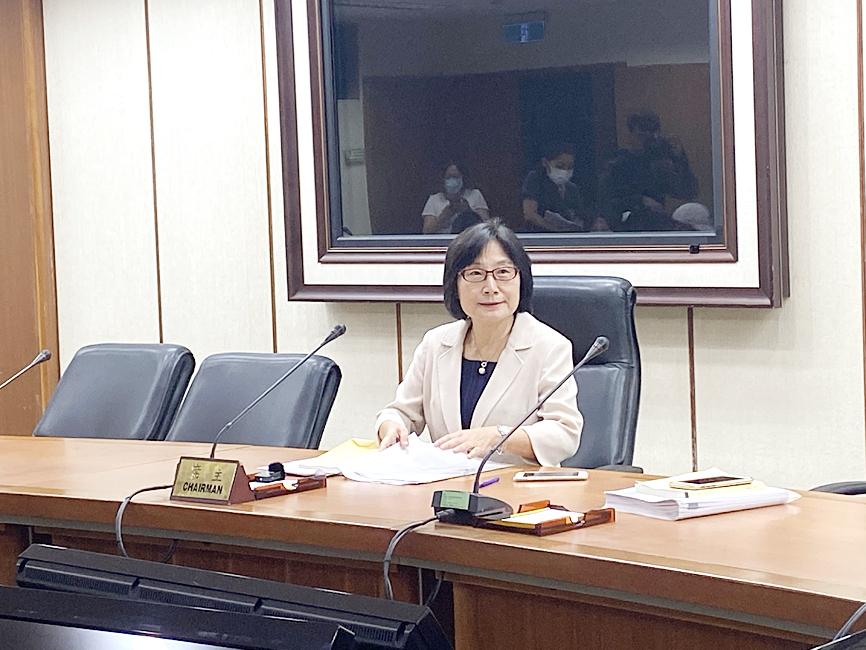The Ministry of Economic Affairs yesterday approved an application by some individual and institutional shareholders of Tatung Co (大同) to hold an extraordinary shareholders’ meeting to elect a new board of directors, a month after the ministry deemed Tatung’s June 30 shareholders’ meeting invalid and rejected registering the board directors elected at that meeting.
“We have determined that Tatung chairwoman Lin Kuo Wen-yen (林郭文艷) contravened the law, as she abused her role as the head of the board and gravely infringed on the rights of shareholders,” Department of Commerce Director-General May Lee (李鎂) told a news conference in Taipei.
Under Lin Kuo’s instructions, Tatung blocked several shareholders, who collectively hold a 53 percent stake in the company, from voting at the June 30 annual general meeting on accusations that they received funding from Chinese investors.

Photo: Huang Pei-chun, Taipei Times
Lee criticized Lin Kuo for abusing her power, saying it is not up to a company to decide whether shareholders have contravened the law, but the authorities.
Lin Kuo has contravened articles 179 and 198 of the Company Act (公司法), both of which relating to the voting rights of shareholders, while the Financial Supervisory Commission on July 14 also found Tatung to have contravened Article 39 of the Securities and Exchanges Act (證券交易法), Lee said.
As the existing board is not legally capable of calling a shareholders’ meeting, the ministry said it therefore approved the petition by some rebel shareholders to hold an extraordinary meeting by the end of November to elect a new board, she said.
Some of the rebel shareholders in a joint statement thanked the authorities for approving their petition and vowed to hold a fair and open meeting soon.
“All shareholders’ rights will be equally respected. One share, one vote,” the petition said.

Hon Hai Precision Industry Co (鴻海精密) yesterday said that its research institute has launched its first advanced artificial intelligence (AI) large language model (LLM) using traditional Chinese, with technology assistance from Nvidia Corp. Hon Hai, also known as Foxconn Technology Group (富士康科技集團), said the LLM, FoxBrain, is expected to improve its data analysis capabilities for smart manufacturing, and electric vehicle and smart city development. An LLM is a type of AI trained on vast amounts of text data and uses deep learning techniques, particularly neural networks, to process and generate language. They are essential for building and improving AI-powered servers. Nvidia provided assistance

DOMESTIC SUPPLY: The probe comes as Donald Trump has called for the repeal of the US$52.7 billion CHIPS and Science Act, which the US Congress passed in 2022 The Office of the US Trade Representative is to hold a hearing tomorrow into older Chinese-made “legacy” semiconductors that could heap more US tariffs on chips from China that power everyday goods from cars to washing machines to telecoms equipment. The probe, which began during former US president Joe Biden’s tenure in December last year, aims to protect US and other semiconductor producers from China’s massive state-driven buildup of domestic chip supply. A 50 percent US tariff on Chinese semiconductors began on Jan. 1. Legacy chips use older manufacturing processes introduced more than a decade ago and are often far simpler than

STILL HOPEFUL: Delayed payment of NT$5.35 billion from an Indian server client sent its earnings plunging last year, but the firm expects a gradual pickup ahead Asustek Computer Inc (華碩), the world’s No. 5 PC vendor, yesterday reported an 87 percent slump in net profit for last year, dragged by a massive overdue payment from an Indian cloud service provider. The Indian customer has delayed payment totaling NT$5.35 billion (US$162.7 million), Asustek chief financial officer Nick Wu (吳長榮) told an online earnings conference. Asustek shipped servers to India between April and June last year. The customer told Asustek that it is launching multiple fundraising projects and expected to repay the debt in the short term, Wu said. The Indian customer accounted for less than 10 percent to Asustek’s

Gasoline and diesel prices this week are to decrease NT$0.5 and NT$1 per liter respectively as international crude prices continued to fall last week, CPC Corp, Taiwan (CPC, 台灣中油) and Formosa Petrochemical Corp (台塑石化) said yesterday. Effective today, gasoline prices at CPC and Formosa stations are to decrease to NT$29.2, NT$30.7 and NT$32.7 per liter for 92, 95 and 98-octane unleaded gasoline respectively, while premium diesel is to cost NT$27.9 per liter at CPC stations and NT$27.7 at Formosa pumps, the companies said in separate statements. Global crude oil prices dropped last week after the eight OPEC+ members said they would